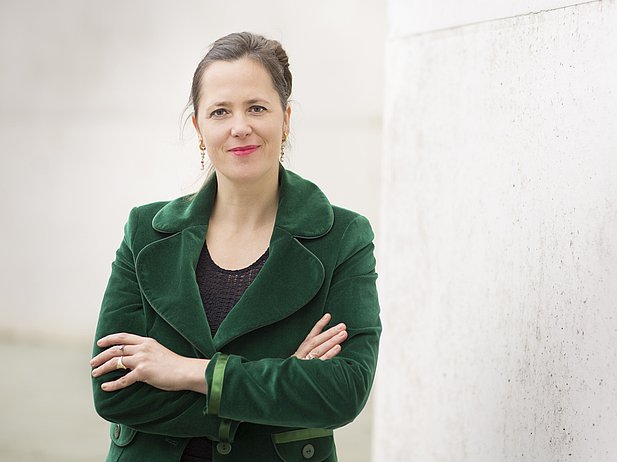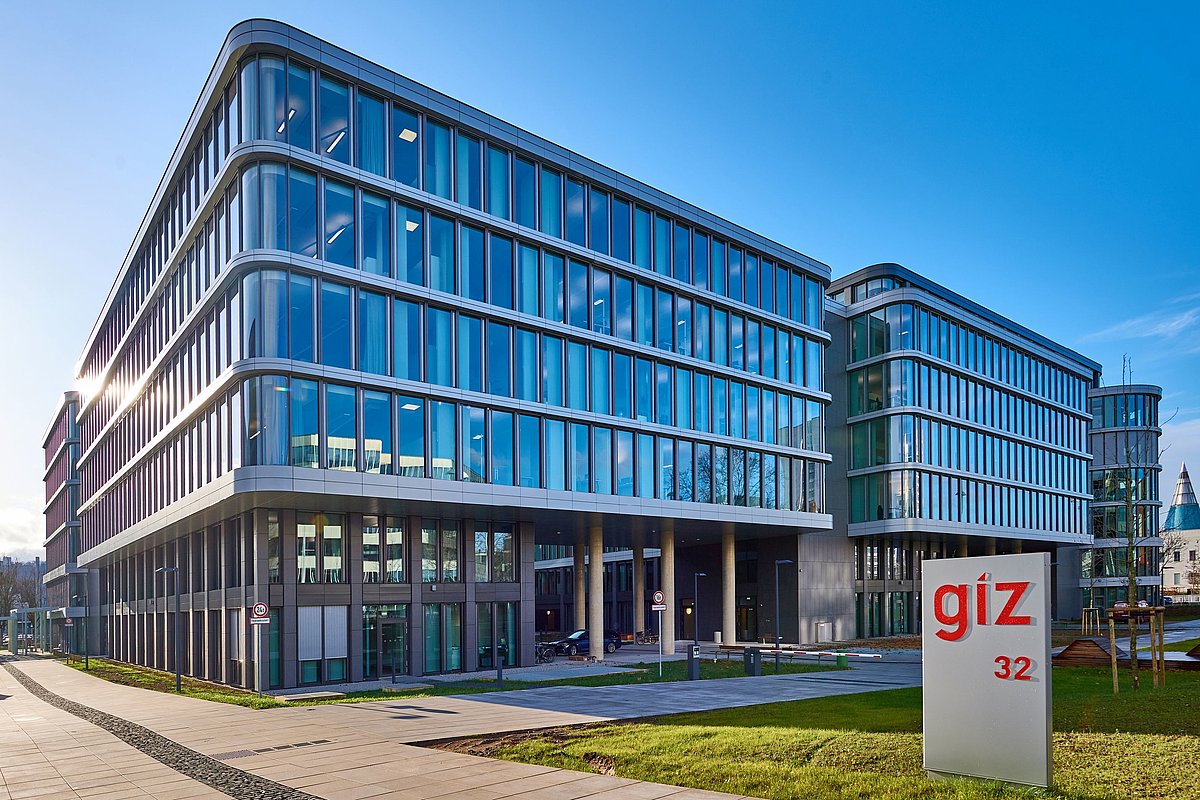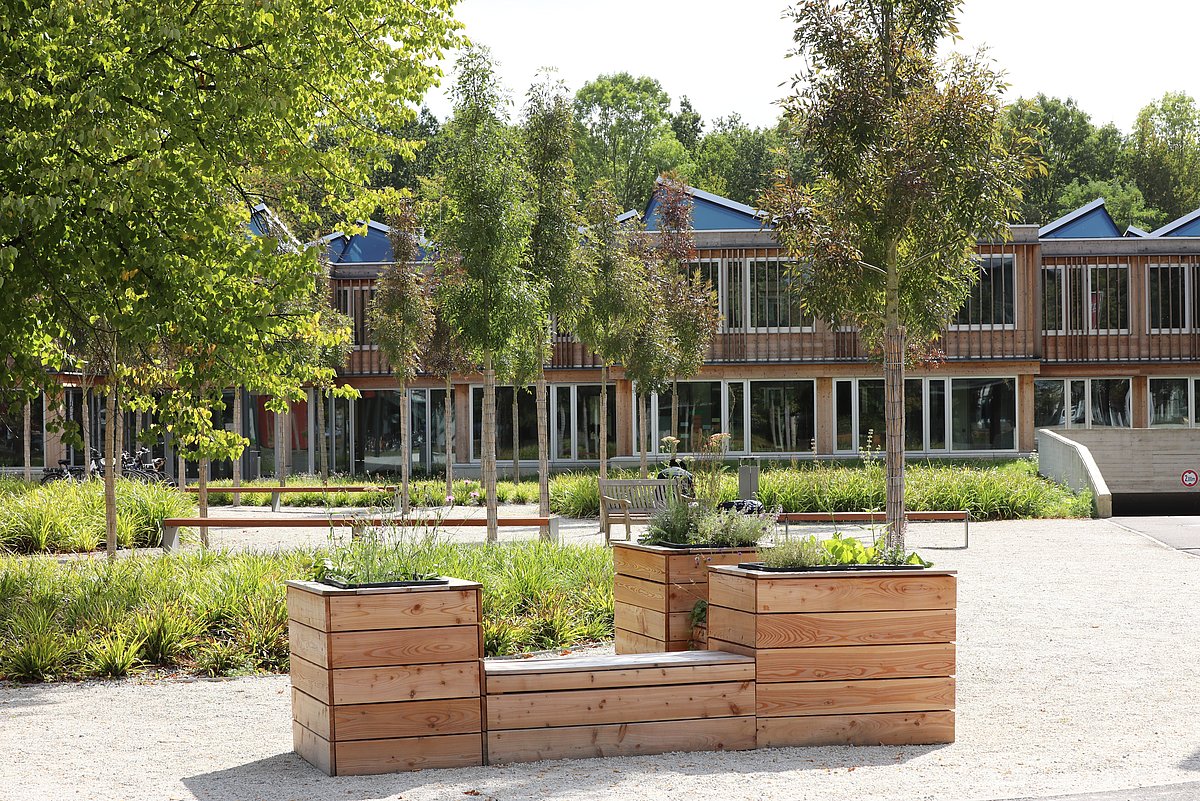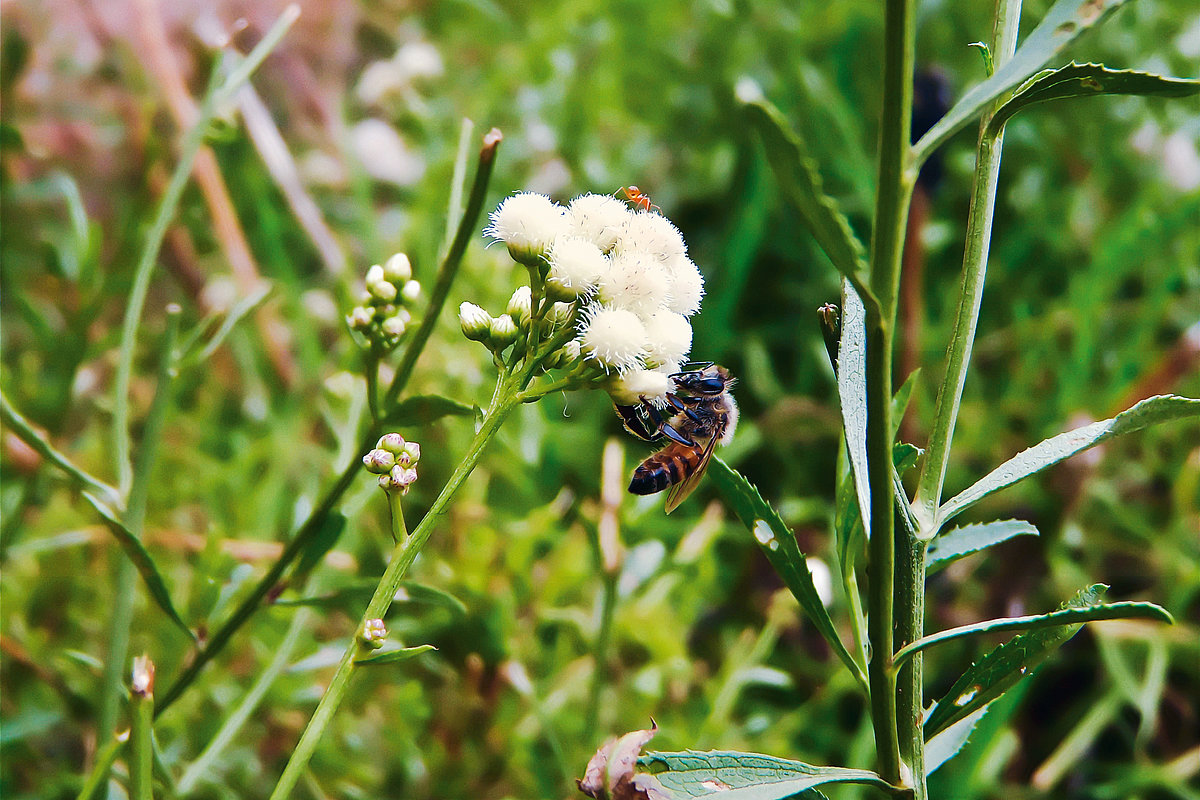We build in line with sustainability
standards and conserve biodiversity
Over the last few years, GIZ has invested in the maintenance of its existing buildings and the construction of new ones. We rely on sustainable design for both renovation work and new construction projects. In recent years, therefore, all of our new buildings at GIZ have been planned, completed and certified according to the German Sustainable Building Council (DGNB) Gold Standard.
New campus in Bonn wins gold standard
GIZ is investing in modern workplaces: following the completion of a new six-storey building at the end of 2019, the Bonn campus now has workplaces for 1,500 people – 500 of them in the neighbouring Meander Building that has been open since 2015. Like the Meander Building, the new campus has won gold standard certification from the German Sustainable Building Council. The campus has been recognised for its energy efficiency, resource conservation and healthy working environment. It has team-working spaces and quiet areas. A photovoltaic system on the roof supplies electricity to eight charging stations for electric vehicles.
'GIZ’s work around the globe is geared to sustainability. That’s why it’s important that we comply with the most stringent standards, and that includes when we are building our own needs. By doing so, we offer our staff a workplace that is consistent with our own corporate values.’
Henriette Strothmann, Director of Property 1 Division
(© Henriette Strothmann)

The Campus Forum in Bonn is set to be occupied from January 2020. Together with the neighbouring Meander Building, it now forms GIZ's Bonn campus. The new six-storey building boasts state-of-the-art meeting and video conferencing rooms, an auditorium for large events, a canteen and numerous innovative communal spaces. Adopting the modern concept of new working environments, the building offers around 28,000 square metres of space for some 1,000 employees.
Approximately EUR 165 million has been invested in this construction project. This GIZ office was also built in accordance with DGNB standards and will be EMAS-validated from 2021. Run entirely on green energy, it has been fitted with a photovoltaic system, including battery storage, that primarily powers the charging stations and charging cabinets for e-mobility. Any surplus electricity will be fed into the national grid in return for a fee. A system of heat pumps with climate-neutral CO2 as a coolant uses energy from the groundwater to meet around 80 per cent of heating and cooling needs. LEDs are used as the primary source of lighting. Charging stations for electric cars and e-bikes in the underground car park facilitate e-mobility among our employees. A large number of covered bike racks and biodiverse outdoor spaces with over 150 indigenous plant species complete the sustainable building design.

construction in Bonn
(© GIZ / Volker Lannert)
Kottenforst Campus also certified
The GIZ Kottenforst Campus in Bonn-Röttgen, which houses the Academy for International Cooperation (AIZ), was ready to move into in late 2017. In addition to the existing buildings, GIZ constructed a new EUR 30 million building that has been used to hold seminars since 2018. This building has its own geothermal energy system, a combined heat and power (CHP) unit and an absorption refrigeration system. There are also four fast-charging stations available for electric vehicles; the electricity for these is generated by the CHP unit. The entire location was EMAS-validated in 2018 before achieving DGNB Gold Standard certification in 2019. Besides technical and economic criteria, the DGNB standard also takes into account minimum socio-cultural standards, such as accessibility. It also assesses the amount of surface area used, as this has a direct impact on the environmental aspect of biodiversity.

Biodiversity: wildflower meadows instead of lawns!
GIZ includes sustainability criteria in its tenders to ensure that bought-in products such as office supplies, printed matter, electricity and cleaning products are environmentally friendly. When it comes to the sensitive topic of purchasing wood products in particular, staff in the Procurement and Contracting Division ensure compliance with international biodiversity standards. Sustainability is also prioritised in the canteen. The company restaurants use traditional varieties of fruit and vegetables from local growers. But there is also potential for promoting biodiversity at GIZ’s buildings themselves.
GIZ’s properties in Germany are mainly located at smaller sites in inner-city areas with little scope for promoting biodiversity. Nonetheless, the buildings are a calling card for the company. The aim is to introduce grass roofs and include as many local insect-friendly plant species as possible in the outdoor areas. GIZ also wants as few of the areas to be sealed as possible.
One example is in Eschborn, where cornflowers, yellow sweet clover and cow parsley attract beneficial insects. Some 700 square metres of lawn have been turned into a wildflower meadow. GIZ is not only offering food, but also a home, for bees and bumblebees. Insect hotels entice these winged visitors to nest – with tangible success: rare solitary bees, whose habitats are highly endangered, have already settled there. These wild bees pollinate many wild plants and therefore preserve natural diversity. A second example is found in Bonn-Röttgen. The four buildings on the Kottenforst Campus border on Kottenforst Forest, which is part of the Rhineland Nature Park. Much of it is a protected area (fauna and flora habitat). Particular attention is therefore paid to biodiversity at this location.

Biodiversity
| Germany1 | |||
| 2017 | 2018 | 2019 | |
| Usable space in m2 | 123,679 | 139,372 | 157,389 |
| Usable space per employee in m2 | 29.5 | 30.2 | 28.6 |
| 1 The data for Germany corresponds to the balance on 18 November 2020. Due to better availability of data, some figures have been updated for 2018 and 2019. | |||
Sustainability aspects at our properties abroad
Sustainable construction is not an explicit field of action in the CSH. Most of GIZ’s buildings outside Germany are leased, and many employees work at offices belonging to partner organisations. This limits our scope for action on this environmental issue compared with construction projects in Germany, which we can gear to GIZ’s needs. Nonetheless, the country directors and project managers in our partner countries also incorporate sustainability aspects into their construction and leasing activities wherever possible.
Role model for other companies and organisations
GIZ intends to lead by example. The company has been part of the cross-sectoral Biodiversity in Good Company initiative since its inception in 2011. Companies from numerous industries have joined the initiative to work together to protect biodiversity and use it sustainably worldwide. In this way, GIZ supports the international Convention on Biological Diversity.
GIZ is also a member of the following associations:
The biodiversity network BioFrankfurt (German only)
German Environmental Management Association (B.A.U.M) (German only)
Society for Tropical Ecology (GTÖ)
International Nature Conservation Agreement Advisory Board
International Union for Conservation of Nature (IUCN)
Umweltforum Rhein-Main e. V. (German only)
WWF Deutschland (German only)